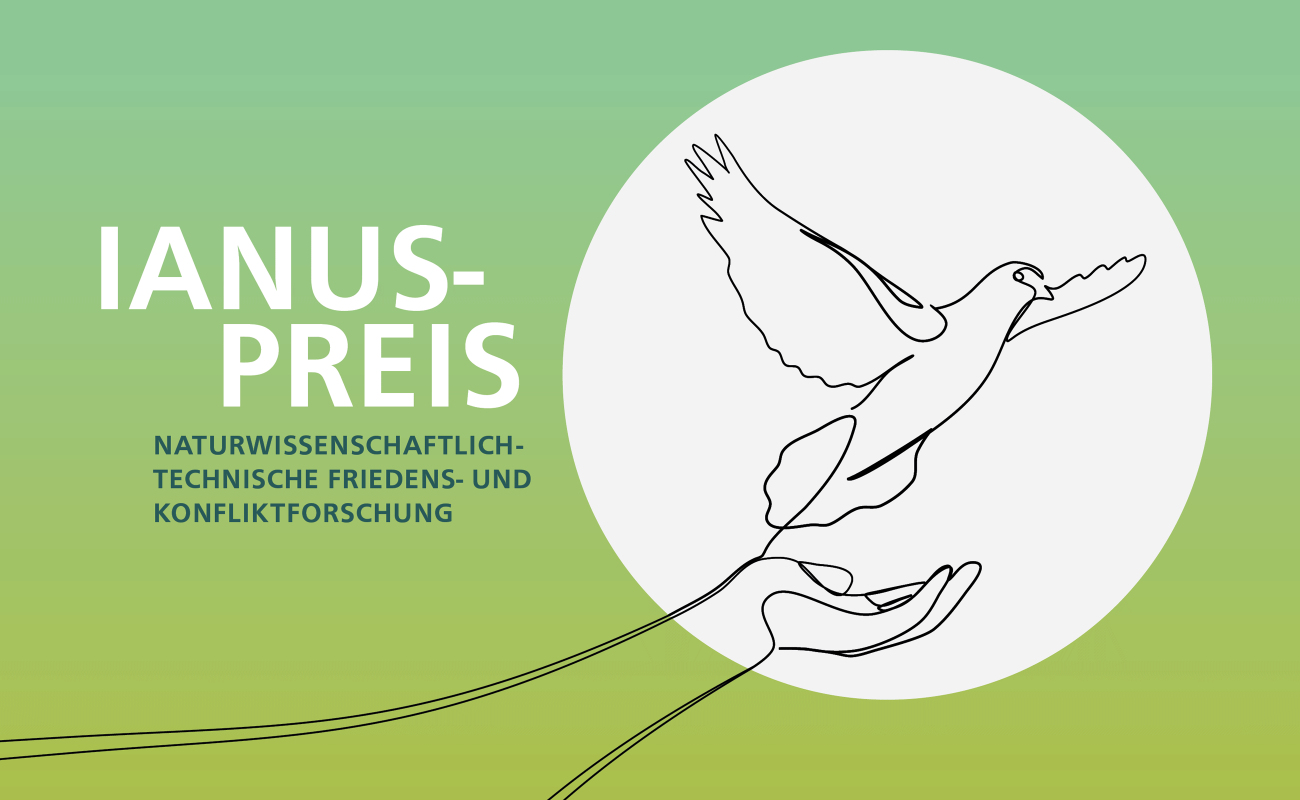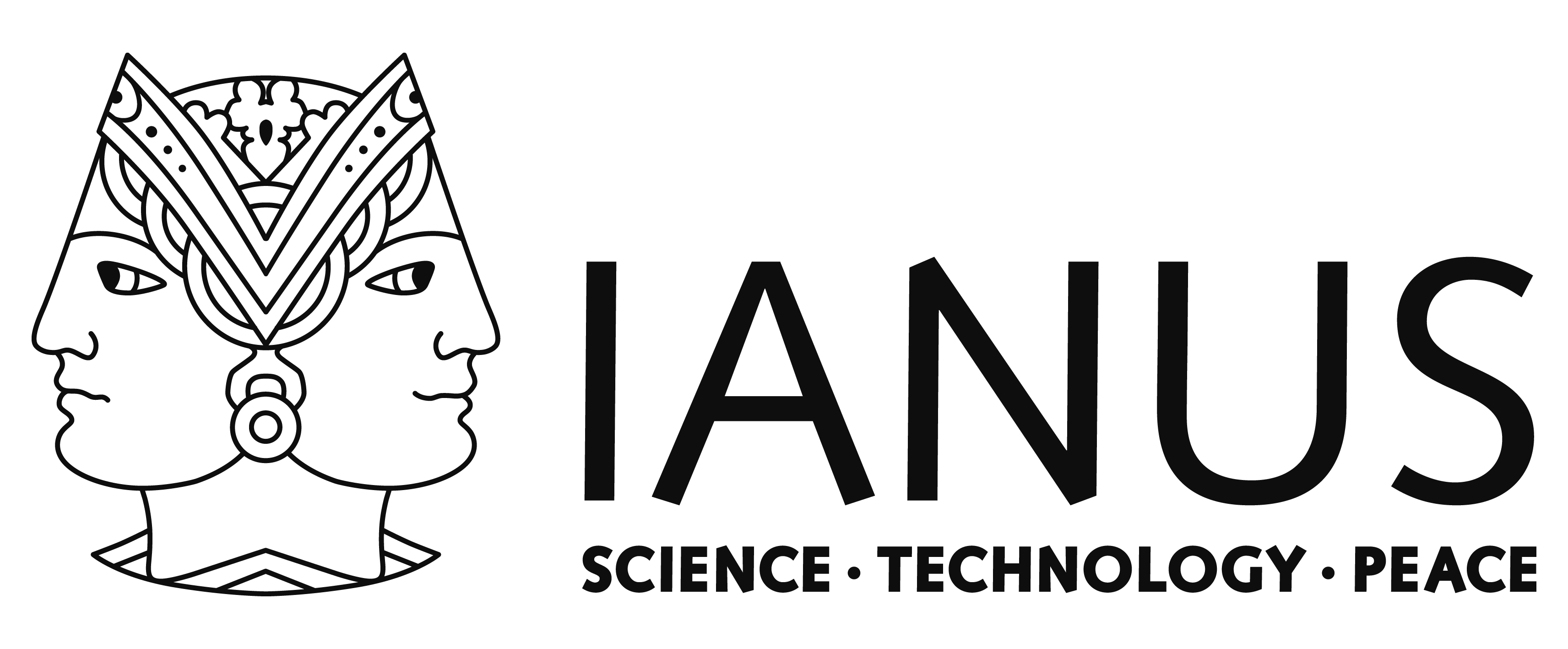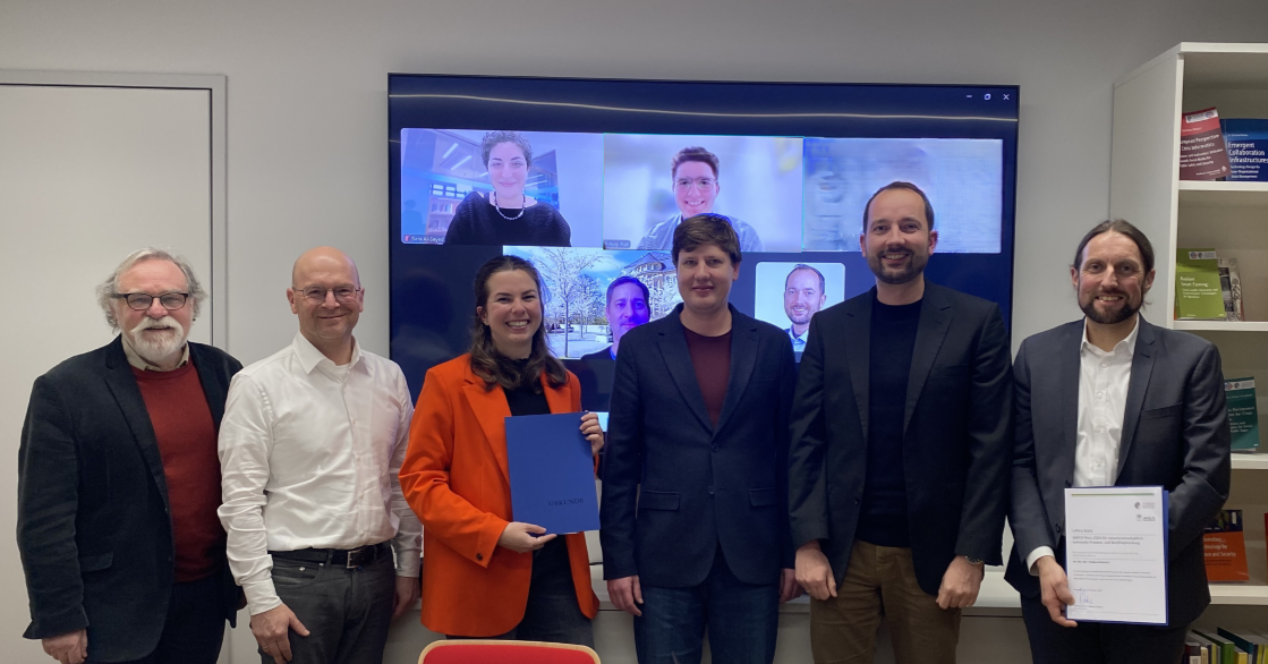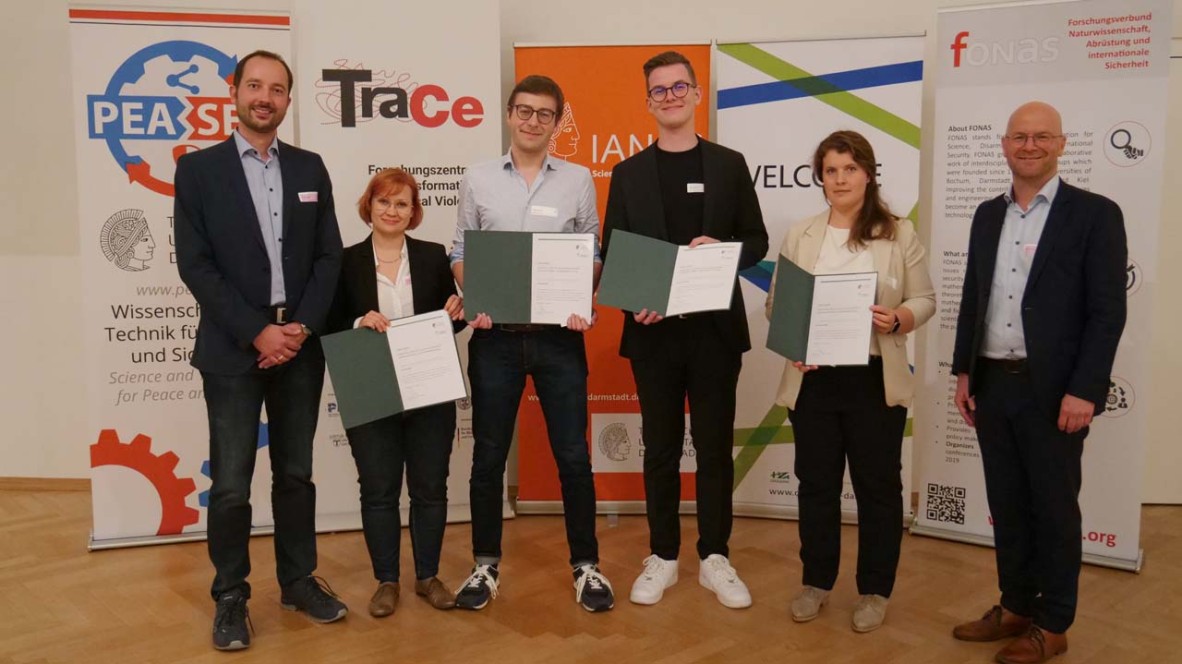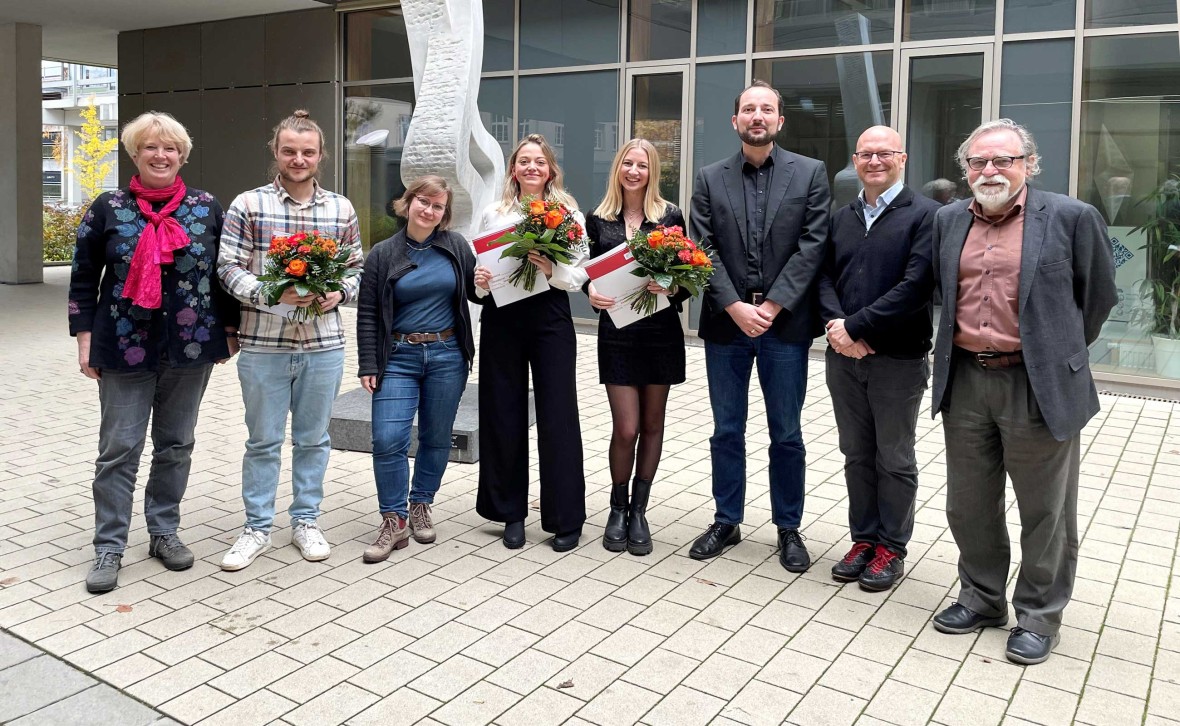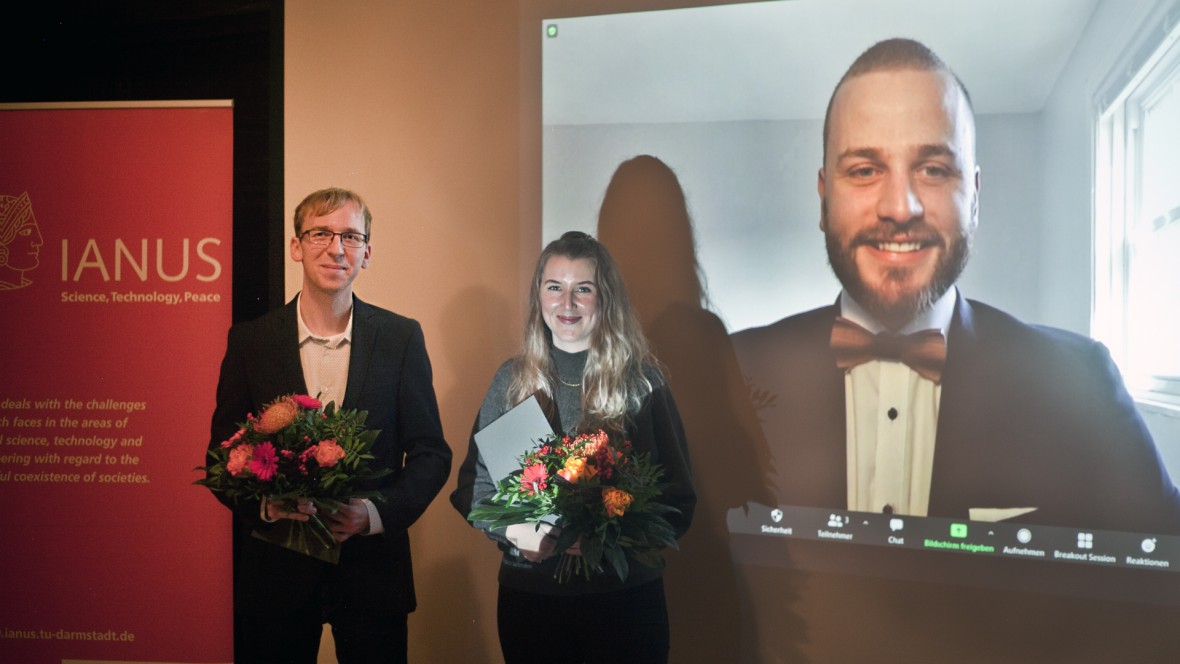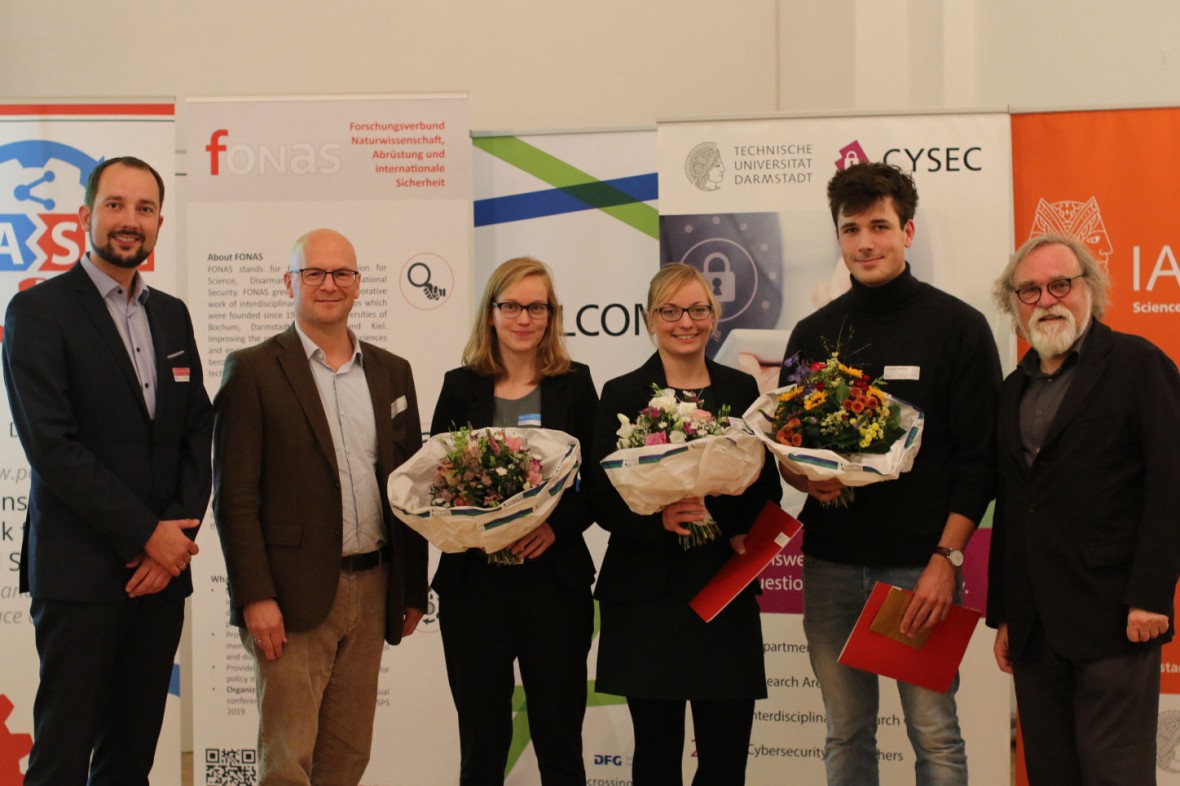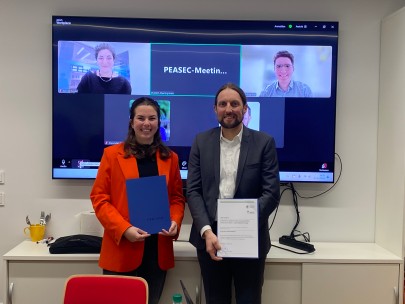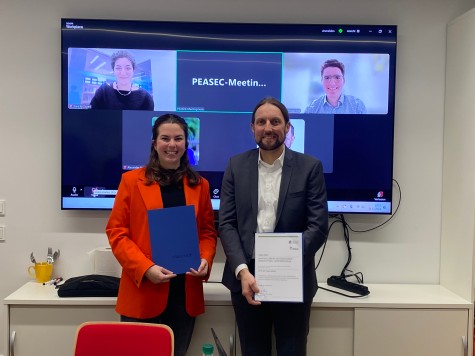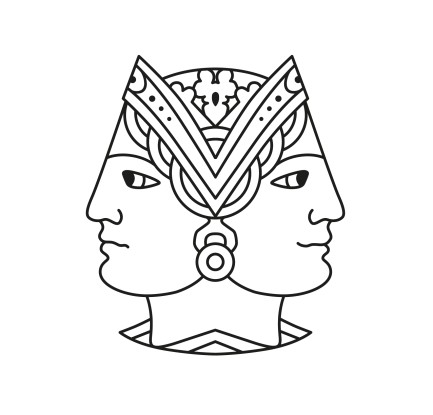Award ceremony – 26. November 2025
2025 award winners
Four papers on biodiversity, information sovereignty, AI ethics, and control of autonomous systems receive awards
On November 26, Darmstadt Technical University awarded the 2025 IANUS Prizes for outstanding theses in the field of scientific and technical peace and conflict research. IANUS stands for natural and engineering science peace research in exchange with the social sciences and humanities and sees itself as a multi- and transdisciplinary network of researchers at Darmstadt Technical University. The prize, worth a total of €1,500, recognizes outstanding theses from all disciplines at the university that deal with issues of peace, security, and social responsibility in an interdisciplinary manner.
First place, with prize money of €500 each, went to Dr. Johanna Berger (biology) for her dissertation on the effects of mowing on insects and spiders and practical measures against biodiversity loss, and Dr. Lukas Struppek (computer science) for his work on security, data protection, and ethical risks of generative AI and technical countermeasures. Second place, with prize money of €250 each, was shared by Dr. Tom Biselli (computer science) with his dissertation on information sovereignty and user-centered digital interventions against data misuse and misinformation, and Anna-Maria Kugler, M.Sc. (cognitive science) with her master's thesis on strategies for human control over AI and autonomous systems. The award-winning works demonstrate how interdisciplinary research makes innovative contributions to peace, security, and social responsibility. The IANUS Prize will be awarded again next year.
Detailed justification
Dr. rer. nat. Johanna Berger for her dissertation in the Department of Biology entitled ‘In the eyes of biodiversity loss: Disentangling mowing impacts on grassland arthropods and finding applied solutions’, supervised by Prof. Dr. Nico Blüthgen and Apl. Prof. Dr. Michael Heethoff
The ongoing loss of biodiversity as a result of intensive land use requires concrete solutions. In her dissertation, Johanna Berger demonstrates the negative effects of mowing grassland in Germany on insects and spiders. Large ecological and experimental data sets show the influence of different mowing techniques on insects and spiders, as well as the positive effect of unmowed areas, known as refugia.
Using an interdisciplinary and transdisciplinary approach, application-oriented synergies for humans and the environment are sought in practice. One example is the online web tool ‘Insect Calculator,’ which allows anyone to calculate the effects of mowing on arthropods in different areas. The work not only highlights the ecological consequences of mowing, but also how environmental education, dialogue with practitioners and science communication can contribute to mitigating the biodiversity crisis.
Dr. rer. nat. Lukas Struppek for his dissertation in the Department of Computer Science entitled ‘Understanding and Mitigating Security, Privacy, and Ethical Risks in Generative Artificial Intelligence’, supervised by Prof. Dr. Kristian Kersting, with co-supervisor Prof. Dr. Daniel Neider. This dissertation examines novel risks associated with the development and use of generative AI systems. It takes two central perspectives: On the one hand, it analyses how generative models can be misused as tools to attack classic machine learning systems, such as facial recognition technologies, and reconstruct sensitive information from the training data, for example the appearance of individual persons. Second, it examines the extent to which generative AI systems themselves can become targets of attacks and manipulation. The focus here is on specific vulnerabilities of diffusion models, including the unintentional memorisation of training data, targeted model distortions through Unicode manipulations, and the introduction of hidden backdoor functionalities. In addition to the systematic analysis of such attack vectors, the work presents various technical solutions that help to make machine learning models more resistant to attacks and manipulation.
Anna-Maria Kugler, M.Sc. for her master's thesis in cognitive science entitled ‘Strategies for Maintaining Human Control in AI-Enabled and Autonomous Systems: A Systematic Literature Review,’ supervised by Dr. Thea Riebe. The thesis addresses the question of how human control over AI-based and autonomous systems can be ensured. Within a comprehensive systematic literature analysis, strategies for human control and supervision in various areas of application are recorded. Building on this, the thesis develops a taxonomy that classifies these strategies along several dimensions, such as the degree of human involvement, the application domain, the triggering factors and the interaction strategy. The analysis shows that different interaction approaches are combined into comprehensive control strategies in different domains, reflecting domain-specific requirements. It also highlights that control is not a one-sided process, but that both the system and users actively contribute to it. A key finding is that the design of user-centred AI systems should aim to promote human autonomy and support people in exercising effective control.
Dr. rer. nat. Tom Biselli for his dissertation in the Department of Computer Science entitled ‘Individual Information Sovereignty: User Perspectives and Digital Interventions for Navigating Privacy and Misinformation,’ supervised by Prof. Dr. Dr. Christian Reuter, with co-supervisor Prof. Dr. André Calero Valdez. The dissertation addresses the question of how individuals can be supported in dealing with digital information flows in increasingly opaque digital environments. The focus is on two areas: (1) the disclosure of sensitive data in the context of privacy and (2) the consumption of information, especially misinformation. To address these challenges, the dissertation develops the concept of information sovereignty, understood as autonomy, control and competence in dealing with digital information flows. Qualitative and quantitative methods are used to examine conceptual insights, user perspectives and digital interventions. The results highlight the heterogeneity of user perspectives and the potential of transparent, personalised interventions in areas such as browser cookies and text-, video- and diagram-based misinformation. Overall, the dissertation thus offers a user-centred perspective from human-computer interaction on how informed and self-determined navigation of digital information flows can be enabled.
The award-winning works of the 2025 IANUS Prize impressively demonstrate the diversity of IANUS research at TU Darmstadt – from ecological issues and digital information sovereignty to ethical and security-related aspects of artificial intelligence. They illustrate how interdisciplinary and transdisciplinary approaches enable innovative solutions to pressing societal challenges and bridge the gap between science, practice, and responsibility. The IANUS Prize thus once again underscores the central role of scientific contributions to peace and security.
IANUS award
IANUS-Award 2026:
Qualifying works (in particular studies/project theses, bachelor's theses, master's theses, publications, or dissertations) that were completed since August 2024 and deal with IANUS-relevant issues could be submitted until July 31, 2026.
The award (1,000 euros) honours excellent theses from all disciplines at TU Darmstadt which are related to IANUS, i.e. which deal with questions of scientific and technical peace and conflict research, and often consider them in an interdisciplinary way, including the social sciences and humanities.
The award will be granted again in 2026 and qualification papers (in particular study/project, bachelor's, master's theses, publications or dissertations) that have been completed since August 2024 and deal with IANUS-relevant issues can be submitted until 31 July 2026.
We ask for nominations, including self-nominations, under the subject “IANUS Award” to ianus-preis@peasec.de. Please attach a PDF version of the submitted paper, a justification for the award (usually by the supervisor) and optional attachments (curriculum vitae, expert opinion).
Papers cover a wide range of possible topics.
- Dual Use
- Sustainable development
- Justice
- Value-oriented security research
- The Ambivalence of scientific and technological progress
- International conflicts
- Vulnerability and resilience
Members of the IANUS jury are Prof. Dr. Markus Lederer (International Politics), Prof. Dr. Dr. Christian Reuter (Science and Technology for Peace and Security), and Prof. Dr. Malte Göttsche (Peace Research in Natural Sciences).
Further information on the call for proposals as well as examples of topics

